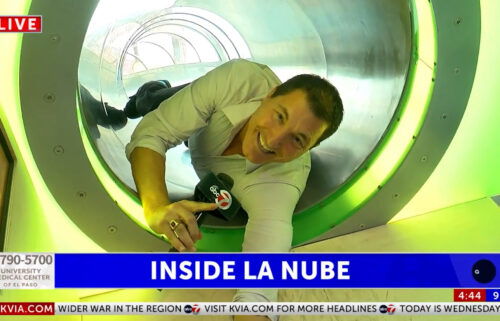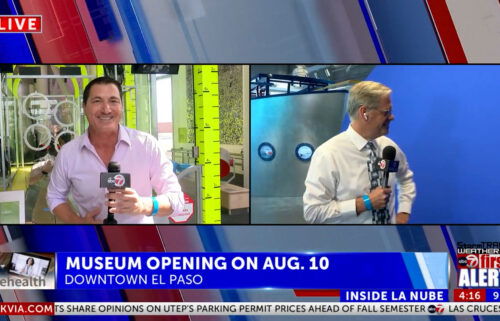Family of fallen British WWII pilot thankful for Oklahomans who made him feel at home
Click here for updates on this story
TULSA, Oklahoma (Tulsa World) — To those who loved Harold Cutler the most, 78 years have done little to soften the blow of losing him.
“On his birthday, my mum’s in tears. Around the time of his death, she’s in tears. Christmas, she’s in tears. It’s still very much an open wound,” said Peter Sitch, a nephew to Cutler.
I visited with Sitch, who lives in London, by phone last week after he reached out to us recently about his late uncle.
Cutler, I learned, was one of a group of British Royal Air Force cadets during World War II who took their flight training in Miami, Oklahoma.
Tragically for Cutler, that service would not last long.
In October 1942 after his return to England, the 19-year-old RAF flight sergeant crashed his plane during a night training exercise. He died from his injuries a couple of days later.
“My mother — his adoring little sister — and my grandmother never got over his death,” Sitch said. “He was their darling boy.”
Sitch said his mother, Mary, who is still alive at 94, and the family have always felt indebted to the Oklahomans who provided a home away from home for his uncle during his training.
And though eight decades have passed, they would still like to thank them.
In letters home, Cutler talked about how warmly the community received him and the other cadets. He also took photos, some of which Sitch provided to us and which we’ve posted online.
They depict residents whom he met, including, possibly, a Davies family from Fredonia, Kansas, that’s mentioned in one letter.
Hopefully, if we get the photos circulating on social media, we can help Sitch identify them and find family contacts.
He never knew his uncle, but feels the same desire to express his gratitude.
And he might even be able to do that in person soon.
He had been planning a trip to Oklahoma last year while visiting a friend in the U.S. The COVID-19 pandemic forced him to cancel, but Sitch would still like to do it when possible.
‘Long, long, long way from home’
“People in the UK sometimes sneer at the idea that we have this ‘special relationship’ with the U.S.,” Sitch said. “But anybody who thinks that our two countries don’t have a great deal of feelings for each other — they just don’t understand.”
“These things go deep.”
The WWII-era flight schools were a case in point.
Cutler was among more than 2,000 British cadets who trained in Miami between 1941 and 1945.
A branch of Tulsa’s Spartan School of Aeronautics, the No. 3 British Flying Training School there was one of seven British pilot training sites set up in the U.S., providing Britain a safe place to train pilots far from German bombs.
As for Miami, the community was more than happy to play the role of host. And it hasn’t forgotten its onetime guests.
Every year, it honors that time in its history, holding a special ceremony for the 15 cadets who died in training and are buried there.
Judging by how Cutler and other cadets described the residents, the warm feelings went both ways.
Local church services definitely made an impression on Cutler.
“He found the enthusiasm and clapping and singing out completely different to his English church experience,” Sitch said.
Harold Stanley Cutler, known by the nickname “Bat” to family, grew up in a small town outside Birmingham, England.
His father was a World War I pilot who’d flown with the precursor to the RAF.
The opportunity to fight in his own generation’s war would elude Cutler. But he still died a hero, flying in service to his country during its darkest hours.
Sitch said he tries to look at it “realistically.” Given the high casualty rate in the RAF bomber command, there’s a good chance Cutler eventually would have been killed in action.
His death “was tragic,” Sitch said. “But it’s a blessing compared to being burned alive or blown to smithereens or crashing into the ground in the middle of Germany and nobody knowing what happened.”
So in a sense, he added, “it was a mercy his dying in England, and able to be buried nearby to where the family then lived.”
For Sitch’s mother Mary, it was small consolation, however.
Just 15 at the time, “she was traumatized by his death,” Sitch said. “She was the baby of the family and obviously very spoiled by her big brother.”
But even as she’s mourned Cutler, she’s been able to take comfort in some parts of his service.
Such as how, during his extended sojourn half a world away, some Oklahomans looked after him.
Sitch said, “Here was a very young man, a long, long, long way from home — back when it took six days to cross the Atlantic. He couldn’t pick up a telephone and just call.
“The fact that the (Miami) community took him and these young men into their hearts, treated them with love, care and affection, is a wonderful testament to the feelings the American and British people have had for each other forever.
“And let’s hope it continues.”
Please note: This content carries a strict local market embargo. If you share the same market as the contributor of this article, you may not use it on any platform.




